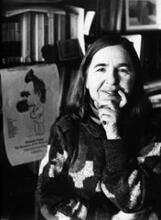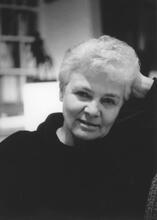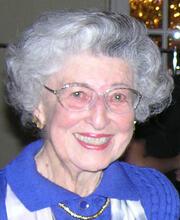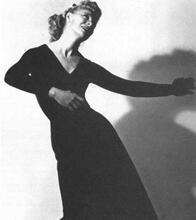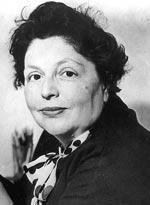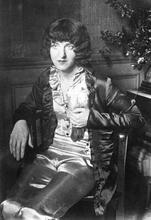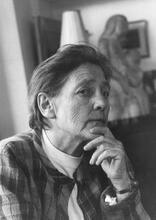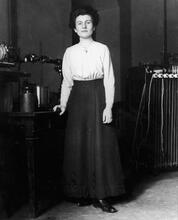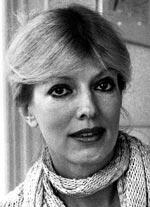Gisela Peiper Konopka
Having escaped imprisonment during World War II, Berlin-born Gisela Konopka built an international reputation as a group social worker aand expert on youth issues. In 1941 she immigrated to the United States and in 1957 she earned a Ph.D. in Social Welfare from Columbia University. Konopka taught at the University of Minnesota, where she directed the Center for Youth Development and Research. After the war, Konopka returned to Germany at the request of the State Department help rebuild social services and education; for her work and philosophy of “justice with a heart” she received Germany’s “Highest Meritorious Medal.” She served on more than 100 committees around the world and traveled globally for guest lectureships. Konopka published eleven books and 300 scholarly articles; she was beloved by her students and received more than 42 awards in her lifetime.
Gisela Konopka’s outstanding career in youth and adolescent services, social work, education, and history is reflected in her litany: “All my life I have been fighting for justice, and for respect for all people. I abhor any arrogance related to race, religion, nationality, appearance, sex, age, intelligence, profession, money. That arrogance is wrong. What is important is what a person is, and does, for the community.”
Early Life & Education in Pre-War Germany
Born February 11, 1910, in Berlin, Germany, to Mendel Peiper and Bronia (née Butterman), Gisela Peiper had two sisters, Hanna (1907–c. 1995) and Ruth (1916–1940). Mendel and Bronia had left Poland to escape anti-Jewish pogroms, and they owned a little grocery store in Berlin. The family lived in two rooms attached to the store, and after her father died in 1935 her mother, who spoke German, Polish, and Russian fluently and was a dedicated reader, although she had not been allowed to go to school as a child in Poland, ran the store. Ruth was killed during a wartime bombing. Hanna emigrated to Palestine in 1935 and her mother followed in 1937.
As a teenager in Germany, Gisela joined a socialist youth group, the members of which rejected all differentials based on social class or money. They wore sandals and loose clothing, and the women wore ribbons and flowers in their hair. They carried guitars and sang, read and wrote poetry, and did not drink alcohol, because it was “the drink of the bourgeoisie.” It was there that she first experienced the positive influences of group dynamics; she would experience the negative influences after the Nazis came to power. It was also where she met her non-Jewish soulmate and future husband, Paul Konopka.
Gisela Konopka studied education, history, psychology, and philosophy at the University of Hamburg, receiving her degree in 1933. The Nazis had just come to power in Germany, and as a Jew she was not permitted to teach or live a professional life. She joined an underground resistance group and in 1936 she was arrested and placed in the Hamburg prison camp. When she was suddenly, and unexpectedly, released, she escaped to Czechoslovakia and in 1937 went to Vienna, where she worked with children. When Germany invaded Austria in 1938, she went to Paris. After the German invasion of France, she fled to Montauban, where she was reunited with Paul. Later they went to a French village, where a Justice of Peace, a French Nazi, refused to marry them because “no Jew and non-Jew should be united.”
Immigration & Initial Years in the United States
In 1941 Konopka received an immigration visa from the U.S. consul in Marseille and sailed to the United States. Within two months Paul also received a visa, and they were married three days after his arrival in New York. Konopka worked briefly as a housemaid until the couple was resettled in Pittsburgh with the help of a refugee committee. She received a scholarship from the School of Social Work at the University of Pittsburgh, while Paul worked in a factory until the United States entered the war in December 1941, when he joined the U.S. Army.
Konopka found a job as a psychiatric group worker at the Pittsburgh Child Guidance Clinic and earned a Masters Degree in Social Service Administration. After Paul finished his service in the U.S. Army, Konopka earned her Ph.D. in Social Welfare from Columbia University in 1957. She received a job offer from the University of Minnesota, where, in addition to teaching, she became coordinator of community programs for the Minnesota Center for Urban and Regional Affairs from 1968 to 1970. She also served as Director of the Center for Youth Development and Research from 1970 until she retired in 1978. Konopka continued as adjunct professor at the University of Minnesota Medical School’s Adolescent Health Program.
Involvement in Rebuilding Post-War Germany
Konopka built an international reputation as a group social worker and an expert on youth issues. After she and her husband settled in Minneapolis, they sent half their income to people in Germany who came out of the camps and needed help. They also sponsored refugees to the U.S., many of whom lived with them for some period of time, and they took in troubled adolescents whom Konopka calls her “family by choice,” as she and Paul had no children. She taught all over the world, beginning in the 1950s when the U.S. State Department asked her to go back to Germany to help rebuild social services and education. Since over 25,000 professionals had left Central Europe during the Nazi period—an enormous loss to German education and child welfare—she taught classes and set up child guidance clinics. She reported that, “Every night one or more Germans would come to my room to “confess” the bad things they had done during the Nazi era.”
Called “the mother of social group work,” Konopka brought to a defeated Germany her philosophy of “justice with a heart,” a concept that values the human being and stresses human dignity, interdependence and mutuality.
Although she was offered many teaching jobs, Konopka chose to stay in Minnesota, where her husband worked as an engineer at General Mills. However, her travels have included Fulbright and guest lectureships in Germany, Holland, Turkey, Greece, Israel, Iran, Hong Kong, Korea, India, the Phillipines, Puerto Rico, Jamaica, Brazil, and Australia, as well as all over Canada and the United States. She also served as a consultant for many corrections programs, which included setting up work training programs for female prisoners for a U.S. Department of Labor and Bureau of Prisons joint project. She served on or chaired more than 100 committees all over the world, and her list of more than 42 awards includes being the recipient in 1975 of the “Highest Meritorious Medal” from the Federal Republic of Germany “in recognition of her work on the rebuilding of German social services after World War II.” She also received the Urban League’s Cecil Newman Humanitarian Award for “outstanding service to the community in the area of human rights and poverty.” In 1990 Minnesota’s governor proclaimed May 24 “Gisela Konopka Day.” She is in the Hall of Fame at Columbia University School of Social Work and is inscribed as a founding member in the Hall of Pioneers at the National Association of Social Work building in Washington, D.C. She was president of the American Association of Orthopsychiatry from 1963 to 1964. Her biography is included in every “Who’s Who” publication, as well as in the Dictionary of International Biography.
Publications & Research
A prolific writer, Konopka published more than 300 scholarly articles and eleven books, including her autobiography, Courage and Love. Her scholarly works include Therapeutic Group Work with Children, also published in German and Japanese, Group Work in the Institution, also in Italian, Danish, Turkish, Japanese and German, Social Group Work: A Helping Process, also in Dutch, German, Japanese, Portuguese, Spanish, Norwegian, and Persian, and The Adolescent Girl in Conflict, also in Japanese.
Konopka’s research areas included psychiatry, group work, social work, social welfare, delinquency, adolescence, and institutional care—fields in which she developed and chaired many programs. The Konopka Institute for Best Practices in Adolescent Health is a collaborative effort of the Schools of Medicine, Nursing and Public Health at the University of Minnesota, and after her retirement in 1978 the annual event sponsored by the Gisela Konopka Lectureship honored her for being “the moving force behind numerous innovative methods in social work and youth service.”
Personal Life
Konopka is perhaps best remembered in the words of her students. Former student David Fogel wrote that “You taught us to praise the light, not to wallow cursing the darkness... You taught us passion for our profession and compassion for our clientele... You sparked an imagery of leadership for social justice... Anyone touched by you is today a bit more human.”
In her old age, Konopka lived in her spacious red wooden house overlooking Lake Calhoun in Minneapolis, which was a tumble-down, unheated summer cottage when she and her husband bought it in 1948. Paul completely rebuilt the house, adding an indoor swimming pool. His wood carvings, etchings, and sculpture shared space with Gisela’s bright abstract needlework and pottery, as well as with their extensive library of books on history, poetry and sociology, while the walls were hung with artworks inspired by Indian, Black, and Jewish experiences.
Gisela Konopka died on December 9, 2003 at the Abbott Northwestern Hospital in Minneapolis.
Selected Works
Therapeutic Group Work With Children. Minneapolis: University of Minnesota Press, 1949. (translated into German and Japanese)
Group Work in the Institution. New York: Association Press, 1954, 1970. (translated into Italian, Danish, Turkish, Japanese and German)
Eduard C. Lindeman and Social Work Philosophy. Minneapolis: University of Minnesota Press, 1958. (translated into German and Persian)
Concepts and Methods of Social Work. Englewood Cliffs, NJ: Prentice Hall, 1958, 1976. (second edition edited by Walter Friedlander and translated into Italian, German and Spanish)
Social Group Work: A Helping Process. Englewood Cliffs, NJ: Prentice Hall, 1963, 1972, 1982. (translated into Dutch, German, Japanese, Portuguese, Spanish, Norwegian and parts into Persian)
The Adolescent Girl in Conflict. Englewood Cliffs, NJ: Prentice Hall, 1966. (translated into Japanese)
Young Girls: A Portrait of Adolescence. Englewood Cliffs, NJ: Prentice Hall, 1976.
For Each Other. Minneapolis: N.p., 1977.
Proceedings of the Annual Gisela Konopka Lectureship. Center for Youth Development and Research, University of Minnesota College of Home Economics, St. Paul, MN: 1985.
Human Dignity: Our Youth and Ourselves. Minnesota Council on Foundations and Minnesota Meeting: 1987.
Courage and Love. Edina, MN: Beaver’s Pond Press, 1988, 1997.


